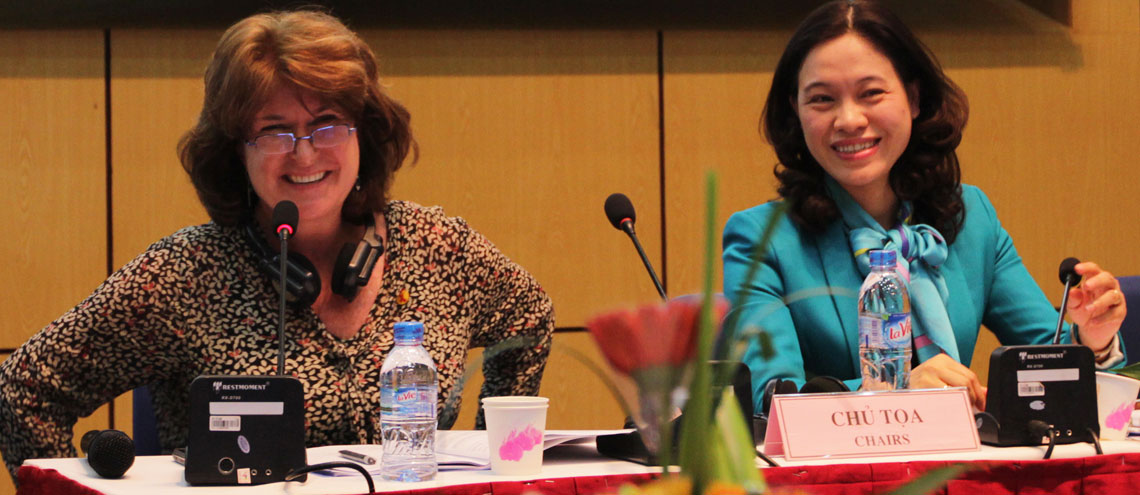UNAIDS Address at VSO HIV Mainstreaming Workshop, 24-25 July 2008
- Friday 25 July, 2008
- Ha Noi, VIet Nam
Colleagues from the VAAC and partner organisations, VSO staff and volunteers, friends. It is my great pleasure to join you today in launching the VSO HIV and AIDS Workplace Policy for Viet Nam.
There are few, if any, places in the world that are not affected by HIV. To respond positively to this reality, employers are encouraged to mainstream HIV into all facets of their work. Ensuring that prevention, treatment, care and support are universally accessible to employees, vigorously opposing stigma and discrimination in the workplace, and raising awareness and reducing the impact of HIV and AIDS are essential.
There are two aspects of the VSO policy that I would like to highlight as good examples for other organisations. First of all, VSO has taken great care to make this a living, actionable document. It is costed – it has an implementation budget. It is reviewed and updated every two years. Most importantly, as we have seen this week, it is localized through the collaborative efforts of many partners.
Second, the VSO policy follows a rights-based approach. It is about this second point that I would like to speak in more detail.
As I am sure you know, after these two days, it is not enough to say that people living with, affected by, or suspected of being at risk for HIV should be treated equally. What is equal treatment? What is discrimination? The rights-based approach endorsed by the United Nations recognizes three core principles: non-discrimination, substantive equality, and personal/employer responsibility.
The VSO HIV workplace policy does an excellent job of objectively, but compassionately, ensuring that people living with HIV are treated equally where appropriate – non-discrimination – and given special consideration when necessary – substantive equality.
According to this policy, people living with, or affected by, HIV are subject to the same policies and procedures as other volunteers and staff. In other words, non-discrimination. This includes recruitment, placement, work conditions, promotions and opportunities, coverage of medication, sick leave, and the right not to be dismissed on medical grounds. In terms of medical issues, they are subject to the same restrictions and benefits as other persons living with chronic medical conditions.
But it is not always enough to treat people equally. Sometimes respecting rights means recognizing, and making allowance for, special needs. Strictly speaking, this is not equality. In the UN we call this ‘substantive equality.’
For example, we could say that people living with HIV should have the same duties and opportunities in their workplace as those who are HIV negative. But what if a person living with HIV were required to attend a workshop in a country that required a blood test before issuing a visa? What if, in the course of completing her or his work tasks, a person living with HIV were exposed to highly contagious illnesses? In such cases, it is necessary to give extra consideration in order to ensure ‘equality.’ The VSO policy allows for paid time off after accidental exposure to HIV; access to paid prevention of mother-to-child transmission of HIV; special leave to care for dependants living with HIV; support to combat stigma and discrimination in the workplace; up to one year of ARV treatment after end of service; and the right to negotiate task adjustments as necessary. These additional rights are necessary to ensure that people living with HIV are not negatively impacted as a result of their status.
Finally, with rights come responsibilities. In addition to the responsibility that individuals have to care for themselves and others, the VSO policy makes employers responsible for providing prevention materials, information and training to their employees, for supporting them to seek voluntary HIV counseling and testing, and for strictly maintaining the confidentiality of their HIV status.
For some years now, UNAIDS has had the great fortune to work closely with VSO and VSO volunteers in Viet Nam. On behalf of my agency, and myself personally, I am both grateful and moved by VSO’s commitment to volunteerism, solidarity, and person-to-person exchange. I congratulate VSO on the development and issuance of this excellent policy and extend my whole-hearted support to it.
Thank you, chuc suc khoe.




